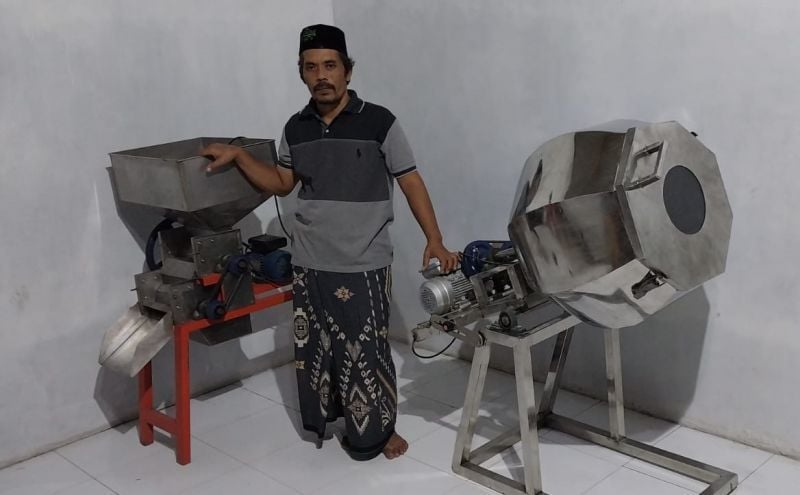Complete Package, Here Are the Advantages of the Tempe Processing Machine by the UNESA Team

Unesa.ac.id., SURABAYA—The Faculty of Engineering (FT) team at Universitas Negeri Surabaya (UNESA) has designed and created a package of automatic tempe processing machines. This innovation is intended to help speed up the tempe production process for micro, small, and medium enterprises (MSMEs) in Sidoarjo.
The machine was initiated by students Vincentius Septian Dwi Saputra, Muhammad Rizky Rizal Maulana, Mochammad Hanif Zainul, and Dafa Naufal Alfiyanto, under the guidance of Dr. Djoko Suwito, M.Pd.
"This machine originated from our findings at FT that MSMEs producing tempe, such as the Tempe Production Center in Sepande Village, Sidoarjo, still rely on traditional production processes. Besides being time-consuming, manual processes also require a lot of effort," said Djoko.
He continued, the tempe processing still uses traditional methods, relying on human foot stomping and manual groundwater filtration. His team came up with the idea to design and create a package of tempe processing machines consisting of four types.
First, the Osto 3P machine, which cracks, cleans, and separates soybean skins. Second, a mixer machine that mixes soybeans with yeast (fermentation process). In the process of mixing tempe with yeast, a ratio of 10 kg of soybeans to 10 grams of yeast is used. One processing cycle can handle 10-15 kg of soybeans in 2-5 minutes.
Third, a fermentation machine, which has a chamber for the fermentation process to support the growth of tempeh mold (rhizopus oligosporus and rhizopus oryzae). During this process, the machine can regulate temperature and humidity according to the needs or weather conditions.
"The fermentation process in the machine can be conditioned. During the rainy season, the tempeh does not get too cold, and during the dry season, it does not get too hot. If the tempeh gets too hot, just turn on the fan or add a little water; if it gets too cold, turn on the light," he explained.
He added that during the tempeh processing, there is a possibility of human error or over-processing. To prevent this, his team created a chamber with a temperature controller set at around 30-32 degrees Celsius, ensuring the tempeh's temperature remains stable.
Fourth, a water filtration machine. This machine consists of a combination of zeolite, manganese, and activated carbon filters. The process involves installing a water pump into the well water, filtering it, and storing it in a tank. The use of this filter combination has proven to improve the quality of well water, and with the pump, tempeh processing becomes more efficient and practical.

It should be noted that the four types of innovative tempe processing machines have met sterilization standards, ensuring they are safe for food processing, and the machines are made of stainless steel.
Agung Prijo Budijono, S.T., M.T., the Head of the Entrepreneurship and Innovation Downstreaming Sub-Directorate at UNESA, said the main challenge faced by tempe MSMEs is water issues. They still use groundwater that is manually collected. Manually collected groundwater is not ideal because it contains harmful chemical elements.
Additionally, groundwater levels rise during the dry season and fall during the rainy season. The machine, designed over 2.5 months, has several advantages. First, it is more effective, taking less than 24 hours from material preparation to tempe production.
Second, the machine is more controlled, hygienic, and can produce a large quantity of tempe with better quality. Third, it reduces direct contact with human skin and sweat, making it more hygienic.
The product will continue to be developed. Agung plans to register the brand and halal certification for all types of tempe processing machines and mobilize a marketing team from students and partner MSMEs. The goal is for this machine innovation to reach a wider market segment.
This year, the innovation team plans to include the machine in the Matching Fund Kedaireka, aiming for downstreaming (applicable to the general public) and commercialization (produced and sold). "Before being sold, it must be tested again to obtain the Indonesian National Standard (SNI) qualification," said Agung.
***
Author: Fionna Ayu Shabrina
Editor: @zam Alasiah
Photo: Documentation of the Tempe Processing Machine Innovation Team
Share It On: